Coffee Conversations - Celebrating Black History & Diversity in Roofing - TRANSCRIPTION
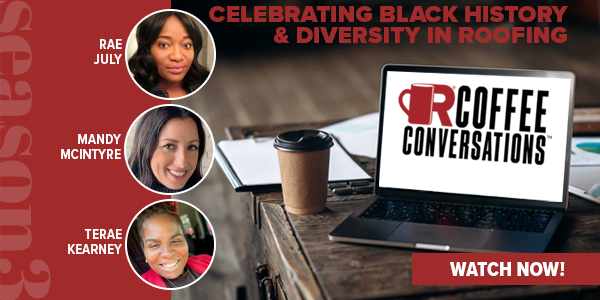
Editor's note: The following is the transcript of an live interview with Mandy McIntyre, Rae July and Terae Kearney. Read the transcription below, listen to the podcast or watch the webinar.
Heidi Ellsworth:
Welcome to another Coffee Conversations. My name is Heidi Ellsworth, I'm the president and owner of RoofersCoffeeShop. And I have to tell you, this Coffee Conversations is monumental. I think it's going to [inaudible 00:00:21] military. So just be prepared everyone out there. This is going to be a phenomenal day. This Coffee Conversation has been a long time in the coming and we are going to be celebrating Black History Month this month, March, with this fabulous panel today, to really talk about what is happening in diversity, equity and inclusion in roofing and celebrate the good things and strategize about what needs to get better. There is a lot, but there's also a lot of great that you'll see today.
Heidi Ellsworth:
I want to thank you all for being here today. I see a lot of names coming through. As you all know, this is being recorded and it is going to be available for you to share out. We hope you share it with the entire industry and with everybody in your company, your friends, people you work with, other roofing professionals. We also, this is Q&A. We want to have your questions. We want to have conversation, good conversation. So please, in the chat in the Q&A, put in your questions, I'll be reading them out as we go along and our amazing panelists will be sharing their insights and wisdom today to really talk about what is happening with diversity in roofing and to celebrate Black History Month. Let's get started.
Heidi Ellsworth:
I do want to remind everybody that Megan Ellsworth is our production producer and she is in the background. She'll be chatting. If you have any questions or any concerns, go in the chat, talk to Megan, but we'll all be able to see and talk to and have that great conversation.
Heidi Ellsworth:
As we get started, I want to, first of all, make a note out to National Women in Roofing. Before I do the introduction, National Women in Roofing is our unofficial sponsor today, basically because I said, yes, we're going to talk about National Women in Roofing while we're doing this. I want to do a shout out because I'm watching a lot of the participants who are coming on right now. And there's one lady in particular that I want to do a shout out to and that's Jennifer Stone, who was the driver of the DEI committee, and so much that's happened in National Women in Roofing, one of the past chairs and a tremendous friend. So Jenny, I know you're listening out there. I hope we do you proud. Here we go.
Heidi Ellsworth:
I would like to first introduce to Terae Kearney, who is with IronShore Contracting. Terae, we just met. We met at National Women in Roofing Day. I am so excited to have you here today. Welcome to the show.
Terae Kearney:
Thank you so much. I'm so glad to be here.
Heidi Ellsworth:
It's going to be great. We're going to hear your story in just a minute. But Terae has been in roofing. She's going to tell her own story. So it is a thing of beauty. And we're going to get to these stories and really hear about their careers. I also would like to introduce Rae July, who is with Chinook Roofing & Gutters, also an RCS influencer. Rae, welcome to the show.
Rae July:
Thank you for having me, Heidi.
Heidi Ellsworth:
Ah, I love it. Love it. So excited. And finally, I want to introduce Mandy McIntyre, who is also an RCS influencer, but she is, Oh, and I didn't mention Rae. Rae and Mandy are both, Rae is a chair on the DEI committee of National Women in Roofing and Mandy is on the committee, DEI. There's just so many things to talk about with you ladies that is pretty incredible. Before we go too much further, I want to have each of you introduce yourselves. Tell us a little bit about you. I'm going to start with Mandy actually. And if you can just introduce yourself and tell everybody about your business, about you, your involvement.
Mandy McIntyre:
Sure. Well thank you for having me. I'm Mandy McIntyre. I am the chair of the National Women in Roofing Cleveland Council, and I'm on the DEI committee for National Women in Roofing. Anything diversity, equity and inclusion is a passion of mine. So Heidi, thank you for highlighting this extremely important topic for black history, because I think it's important to note that black history is American history and it's part of our collective culture that has been overlooked and underrepresented. Having this conversation is huge, and I just really want to thank you for giving us this platform to discuss it.
Heidi Ellsworth:
It's our honor. RoofersCoffeeShop I'm telling you right now we are honored. Terae, can you introduce yourself and tell us just a little bit about you?
Terae Kearney:
Yes, ma'am. My name is Terae Kearney. I am a project manager with IronShore Contracting. We are an MBA roofing subcontracting company. I've been here for almost, I want to say eight or nine years. Literally the conference this year was my first time, as I told Mandy, seeing so many women in a room just under roofing, and that's to me was just breathtaking. Being able to not only use a platform such as this, to be a voice for women, but also to be a voice for black women, it's very difficult to put in words. So I just thank you.
Heidi Ellsworth:
Ah, we all feel the same. Wow. Rae, can you introduce yourself?
Rae July:
Yes. I'm Rae July. I'm the Director of Steep Slope Operations here at [inaudible 00:05:56] Roofing. We are now building envelope services. It's still new. So I'm getting used to it. We operate out of Tacoma, Washington, and I've been with the company for seven years. I've also been in the roofing industry for seven years. This is the only company I've been with.
Rae July:
Being the co-chair of the DEI committee, along with Mandy and Jess has in truly a great experience so far. We've been given a platform where we can highlight not just women, but the underrepresented women like black women, Hispanic women, native American women, Asian women. So, just keep looking out for all the posts that we share on social media and our newsletters. There's a lot of great things happening and I'm so excited to be part of it.
Heidi Ellsworth:
And we're going to talk a little bit more about that coming up, but before we do, we wanted to start with National Women in Roofing. I think one of the biggest thing, and in roofing overall, I have to tell you, I see this across the board in all of roofing, is we are storytellers. We like to tell stories. We like to share our stories, how long we've been in roofing, what have we done, where we're from, other things. So today, what I really wanted to start out with was the Rae and Terae, your stories. Maybe Rae you can start. Your story as a black woman in roofing. And tell us what all that means and how. That journey.
Rae July:
For me, it means representation. It means being able to have a platform to share what it means to be a black woman. It means creating a space for other women. I've always wanted to have an impact in whatever it is that I'm doing, and using the platform that I have with NWIR and the DEI committee and sharing consistently, this is who we are and we're here to stay. We're not going to fade into the background. I'm a talker and I can be loud sometimes, so it's a perfect fit for me.
Rae July:
It's very important as a black woman to share who you are with other women, because sometimes there's a disconnect there. This year for the very first time, NWIR Day had a second day, and that session was moderated by the DEI committee. We had spent the previous six months talking, well, we read the book, so you want to talk about race. And we had a session of book discussion, and it started off with Mandy giving us some stretching and relaxing yoga to get us in the mood to discuss this book. And then I moderated this book discussion. One of the things that stood out to me during that session was when I shared a very personal story about my son. One of the discussion questions was, is it always about race?
Rae July:
And the story I shared, some of you on this call have heard the story. So forgive me for repeating myself here. But the story I shared was about my 10 year old son. My son is biracial and he walks to school every day. And every morning he leaves home at 8:30 to walk to school. And between 8:30 and about 9:15, it's the hardest time of the day for me, because I'm concerned that because my son loves to wear a hoodie on his head and it's winter, somebody who might look at him and perceive him as a threat could hurt him. And the only reason why that scares me is because of what I've seen in the media.
Rae July:
So when I sat there and I shared this with the women in the room, a lot of women just were hurting for me. And they were like, I just can't imagine what that's like having to worry about my child like that. I told them, I said, "If my phone rings between that 45 minute period, and I don't recognize the number, my heart skips a beat. I'm terrified to answer the phone because I don't know what that call is about."
Rae July:
It kind of took me back to last year at NWIR Day, one of our keynote speakers, Megan Keys from JM shared a story about her son. And when George Floyd happened, she remembered where she was. And remember calling her son, who's away at college. That panic that sets in, that panic never goes away. It doesn't matter how old your child is. And so, these are stories that we share with the women in our industry, because sometimes being able to see the human side to it, the other side is helpful in understanding who we are as women and the journey that we go through. Yes, I'm a director of Steep Slope Operations at a roofing company, but I'm more than just that. I'm more than roofing. I am also a black woman who deals with things every day.
Heidi Ellsworth:
And I think that's where we start understanding how many of us are worried when we're at work, what's happening with our family, what's happening with the kids, what's going on. And then to have that terrible one step further of worrying, are they going to be safe? What is going to happen? I think those are the kind of stories that are so important to share. And that's why it's so ready that you're bringing out what everybody else is thinking. And now we can start talking, having those conversations. So powerful. So powerful. Terae, how about you? Talk to us your story.
Terae Kearney:
Well, I'm still going through Rae's, so forgive me. Bless you, Rae. I definitely understand. For me, my story starts, anyone who knows me with my mom. And always two things ring near and dear my head, you have two strikes against you. One, you're a woman, two, you're a black woman. I've carried that with me everywhere I go. And the reason I say that is because if I didn't have that with me, I wouldn't know how to get through. I cannot change the color of my skin. I can't. Everyone has different religions and can be of different skin tones. And you can take something off if you want to, to try to blend in. I can't take this off. I can't. And because I've always known that, and on top of being the only girl out of six boys growing up, I have a different mentality, and that mentality is what has become a part of my story in this industry. Of course, I did civil engineering, so I'm already starting out in a field that's predominantly male there. Remember, you're a woman. So I already have that strike.
Terae Kearney:
So for me, once you bring the color into it, I already have the strike. I'm just going to keep pushing. I use that as my fuel to keep going and I like a challenge. I was that weird one where math and science got me then, I was just good at them both. In addition to English. That was also my favorite subject. You don't meet too many people who like all three in the same.
Heidi Ellsworth:
Yeah.
Terae Kearney:
Once I got into the roofing industry, I was faced with a lot of challenges. I was. I'm not going to lie. My representation was questioned. I never forget every time I would go to the roof, it didn't even matter if it was a black man. The first question you got was, going to the roof, why are you going to the roof? And I've learned to kind of use that as a little ammunition. I like that. It's a little suspicion. It's like a superpower. You don't know. You don't know. And it's okay. And then it's just like, boom. And you hit them and it's, I didn't know she could do that.
Terae Kearney:
And because there are always surprises in this industry, Hey, sometimes you got to make some good ones, because it's a lot of bad ones that can take place all day, every day. That's why I always say I've learned that perspective is key in everything. And I try to bring that different perspective because like I said, I can't change this. I can change this and you can't take this away from me. My goal is to always try to connect here and here, because here, it's not much I can do and I've always known that.
Heidi Ellsworth:
Wow. Thank you. Thank you. Thank you. I want to kind of dig deeper a little bit into Terae what you're saying. We've had this conversation before, but kind of what you're saying about, I know all women deal with this a little bit. Like, how am I presented? How am I dressing? Do I need to worry about it? Which I kind of like, Ugh, but there is this responsibility that I think women feel, and especially black women. So maybe talk about that. You talked about it before, Rae. Maybe you can start just about that presentation.
Rae July:
Yeah. Like Terae, growing up, I heard the same thing. You got two strikes against you. You're a woman and you're a black woman. It's something that we hear all the time, but there's an added thing to it. Mandy, when you get up every day and you go to work, you represent Mandy. That's it. When I get up every day, when Terae gets up every day and we leave and we go to work, we carry an entire race on our shoulders. We represent for every black woman out there, the way we speak, the way we present ourselves, the knowledge that we have, our placement within a company, we represent an entire race. And that is a burden that we don't want to carry. But like she said, I can't change the color of my skin, but I can change the people's minds about who I am and who black women are. That's all I can do.
Rae July:
And so, when I present myself, that's the way I'm constantly having to present myself. When I speak, I have to think, okay, how is this going to sound to somebody? Am I going to sound too ghetto? When I do my hair, is my hair too ethnic? Are they going to understand if I dress a certain way? Am I going to come off as too hood or whatever? Those are things that I'm constantly worried about. So, it's a burden, but it's a burden I'm willing to carry because, you know what, I think this black girl magic needs to be spread all around the world, and that's my goal.
Heidi Ellsworth:
Yes, yes, yes. We all agree.
Terae Kearney:
Yes.
Heidi Ellsworth:
Terae, same thing. You're going on the roof, you're going in the office, you're an engineer, how does all that come together and how you feel you're presenting yourself?
Terae Kearney:
I've tried to use it to my advantage as best as I can, because we all know, race, sex, you're going to go through some stuff in life that you cannot avoid. And if you took the time to sit down and put what you see in front of you behind you, to listen and connect with the person in front of you, you realize how much we have in common, that one thing will not allow you from getting there. And the interesting part about it is again, back to perspective. And I do this just because of what I've seen in the industry from where I've sat from being a project engineer to then coming up to being a project manager and just getting an opportunity, what I like to call a sitting in the audience and getting, I see people mess up. I see people clean it up. I see the does. I see the don'ts. With that being said, I've learned that, I'm sorry, I lost my train of thought.
Heidi Ellsworth:
You've got all of us right here.
Terae Kearney:
I'm sorry. I'm sorry. When you bring all of that together, it kind of gives you a different perspective on how you're going to move forward. What I've always tried to do is, okay, I know I can't talk. If I talk to this person the same way that they're talking to me, I'm not going to get anywhere. I'm not. I have to take a different approach. And because it's ingrained in me from the beginning that I have these strikes against me, I'm going to always have to, like she say, carry that on my back when I walk into the room, but I use it as tools as opposed to something that can cripple me, because I already walk into the room with expectations of somebody thinking that I'm crippled. So it's just that keep pushing forward to again, I can show you better than I can tell you.
Heidi Ellsworth:
As you're talking, Terae and Rae, one of the things just going through my head is I think about power of numbers. When we're an individual, when we're the only one who looks like who we are in a room, it's hard to have that push forward like you're talking about. You still do it [inaudible 00:21:00] harder. All of a sudden when we start recruiting and bringing more diversity, more people like we saw at National Women in Roofing Day, all of a sudden now, it's a whole different topic. And you approach things different too. Don't you feel that way?
Terae Kearney:
Yes, ma'am.
Rae July:
Absolutely. Yeah.
Heidi Ellsworth:
I've felt that. I felt that, and I'm not a black woman, but I've felt that, that I now have people who I can turn to that sometimes I can just walk away where before I couldn't just walk away. I felt like my career or things were on thing. Now I can turn around and say, no, I know the better thing. I know the better community, the culture, the diversity, the people who to surround myself with. And so I can make different decisions now, which is why it's so important to bring more diversity, to bring them in, bring them all in to roofing. And so I kind of want to talk about that. I want to take that next step. And Mandy, maybe we could have you talk a little bit about this. You had some amazing comments on this during the coffee conversations at IRE about there's no labor shortage. I think most people out there would be like, what? So share with kind of where you're coming from on your labor shortage.
Mandy McIntyre:
Well, if you look at Gen Z and millennials, they're the most diverse racially, culturally generations to date. And representation matters to this new generation. It's not the old school roofing world anymore. It's not the white boys club anymore. I think the world is evolving and the roofing industry needs to level up and evolve as well. And that means elevating your business. It means changing your company culture. It means being more inclusive. It means putting in diversity, equity and inclusion initiatives and taking true action with that. And that will then broaden your company to invite a more diverse workforce and also invite a more diverse clientele because it's not just potential employees, it's potential customers too, that are looking for these same things. They're looking for representation. They're looking for diversity. They want companies that care. So when we talk about labor shortages, I just think that people aren't looking in the right direction, they're looking in the same place. And it's a whole world out there that is being overlooked and it's underrepresented.
Heidi Ellsworth:
Yes. Rae, you're leading the diversity committee, and you saw the difference, you're saying, and maybe you can share that, the difference between last year and this year, just in what you've seen in the year by having these conversations, but how do we recruit more diversity?
Rae July:
So last year, I felt like there was maybe a little bit of diversity at NWIR Day. Wasn't a whole lot. And this year, as I stood at the top of the stairs at registration when I got there, and I just saw these women of all color, shape and sizes just coming up that escalator, my heart was just so filled the joy, because this is the first time that I'd seen this. And this is my fourth year attending NWIR Day. And this is my first time seeing so much diversity. What we're doing has been working. Representation matters. When they see someone like me with a platform talking about being a black woman in the industry, it helps other black women come out.
Rae July:
When we share these features that we've been sharing all month long for Black History Month, it makes other black women in the industry see that, and go, wait a second, I want to be feature too. That could be me. How do I get on this? How do I share? Because seeing someone who looks like them be open and honest about what it's like to be a black woman in this industry is the catalyst that we need to bring more diversity into the industry.
Rae July:
I know people are going to say, well, what if I operate in an area where there's no diversity in the demographic? Diversity isn't just about race or religious beliefs, diversity can be in age as well. We need to look at that and say, okay, if your company is run by older men in their 70s or 60s, they're aging out, where's that younger generation, where's that younger group of employees that's just waiting for a shot that you can train and have them take the reign and move this industry to the next level, because we are evolving. The roofing industry is changing. Look at the way we installed roof 10 years ago, 15 years ago, to the way we do them today. It's different. If our products are evolving, our people have to evolve as well. Otherwise, we're dealing with stagnation and that's not going to be beneficial for growth.
Heidi Ellsworth:
No, that is so true. So true. Terae, with what Rae's saying, and I'm thinking about what you said about math, science, English, how you loved all of that. There's so much potential within our industry for people who love that, all people. So how do we get more? How do we stem? How do we get more women and black women and all minorities, everybody, diversity across the board into roofing, do you think?
Terae Kearney:
I'll take the approach from the undergrad, coming out of undergrad, because Rae did a beautiful for job explaining, she did a wonderful job explaining everything else as to where we are now and how we got here. When I graduated, I'm going to be honest, I did not know that construction was going to be the way. I didn't. And the only thing I had to go off of was that I was a good problem solver. And that's one thing, engineering, stem, it teaches you, it teaches you how to solve a problem.
Terae Kearney:
And then the more that I started to matriculate, I started to see that a lot of project engineers that I'm working with general contractors, they're coming from HBCUs, they're coming from PWIs. They're all coming from college, but everybody has some type of stem background, and it's because everyone knows how to solve a problem. However, what I think would be more helpful is to come to the forefront and get in front of these schools and these institutions, [NRCI 00:28:16], things of that nature, in order to present to them these opportunities, because here's the thing, these teachers, they have students, they have families. Then you throw [inaudible 00:28:29] in there. There's so many different things that are going, there's still human beings as well. And they have to come to this institution. They have to teach these students and they still have to go home. And it's college. It's different. It's a completely different monster, but still they are teachers.
Terae Kearney:
And with that being said, once you get all of that in, are you going to think about roofing? Are you going to think about, no, you're not. You're thinking about exactly what you're focused on because it's what's familiar to you. It's what you do every year. It's the course. It's what the children need to graduate, but what's going to keep them sustained once they graduate? Where are the job?
Terae Kearney:
A lot of engineers you need PEs. You need FEs, those take time, those take practice. And again, everyone's human. So if it was broadcasted more, if it was brought to the forefront more in these institutions and more information was given out, and there was push on both sides, the same way GCs like to push their subcontractors to get done on these dates. So long as everyone's working together on both sides. It's not just one person pushing, then we can make better steps forward. And it's not going to happen overnight. It's not, but to take those steps in the right direction, some consistency is key.
Heidi Ellsworth:
Well, and it feels to me too, if we're going to be pushing onto the schools. When I think about the student competition that just happened, there are a few women in it, mostly young men still. There was no diversity as in race, or no Hispanic, no black. So to me, it feels like we need to also be very proactive in reaching out to the universities that have more diversity, that have diversity within their construction management schools, because it's not just good enough to say we want to do it. We need to, and I have not been successful yet. I'll be the first one to say it, but I'm on handshake. And I have all historically black schools on handshake because I'm trying to look for interns in media and publishing. I have not done a really great job, but I'm trying because I want that same thing. And it seems like as an industry, we need to highlight what we see happening and invite all the diversity in.
Mandy McIntyre:
Heidi, if I may. One of our features for Black History Month is Ariel Houston. She is a construction management student at Kent State University. The Cleveland council is actually doing a panel for WIC week at Kent State University for the construction management program. First choice, we've had two interns come from the construction management program. The president of the student organization is a woman and she was our intern. Leah, shout out if you're watching this. I think it's important for contractors to get in. If there is a local university or college that has construction management engineering, what have you, get involved with those student organizations, host them for a lunch and learn. We did that here, and just get involved as much as you can.
Heidi Ellsworth:
Well, last year we did have Christie Holbrook with Graham. We had Jasmine on too, beautiful young black lady. Oh, the energy that came off of her was just incredible. And so, I think, yes, Rae, go ahead. Were you going to...
Rae July:
Sorry. I was reading the comments that are coming in and Heather says it starts before they get to college.
Terae Kearney:
That's true too. That's very true.
Rae July:
It starts at a very, very young age. Are we going into the elementary schools? Are we working with the stem programs in these schools to promote our industry? Because again, we have to remember, roofing is not just about material installation, roofing is about product development, product management. There's so many facets of the roofing industry. And if we are not going to think outside the box, we are always going to have the labor issue we're having right now. Because every everybody's talking about the labor issue, but what are we doing to solve the issue? Are we being innovators and saying, okay, let's go deeper. Let's go beyond whether it's the trade schools or the elementary, let's go beyond that. Let's put together a working group and examine how we can go into these other institutions and talk about the roofing industry and how important it is, because everyone has a roof over their heads. Nobody cares about it until it leaks.
Heidi Ellsworth:
That's right.
Rae July:
It's a vital industry and we're not going anywhere. We have to do something. We can't just talk about the problem. We have to be proactive.
Heidi Ellsworth:
Well, I've been kind of watching the time here, because I want to get a couple of our questions, but you guys are right. The chat box is blowing up. I want to read a couple of these. From Nigel. Hello, Nigel. I'm so glad you're on here. I feel for you, amazing black women. And I emphasize with you as a black man who has been in the industry for 24 years, the struggle for opportunity is real. Kudos to you for telling your story and kudos to NWIR for giving a platform. Your light years ahead of the NICA. We're going to put that [inaudible 00:34:16]. Nigel. Thank you.
Terae Kearney:
Thank you, Nigel.
Rae July:
Thank you, Nigel.
Mandy McIntyre:
Thank you, Nigel.
Heidi Ellsworth:
Maria also said, it's like you're that aunt in a jar and you have been taught you can only jump so far, even when there should be no lid on the jar to success. That's really, yeah, let's talk about, Terae, maybe talk a little bit about that. Have you felt that in the industry or overall?
Terae Kearney:
As far as being told you have limits?
Heidi Ellsworth:
Yeah.
Terae Kearney:
Have I been told I had limits? No, they don't come out and outright tell you. The actions kind of to tell you, but because of the type of woman that I am, I have limits. I already come in the gate with limits. So how much more are you going to limit me? You know what I mean? The limits, they aren't vocalized. They're more so actions. The reason I pause to think about it is because there are limits every day. Things that I can't control. I try to control only what I can control, and that's the best way that I can push forward because like I said, there are limits just working in construction. It's hard to really pinpoint that because here we are having the conversation because of such, because of those limits.
Heidi Ellsworth:
Yeah. One of the things I heard a lot, and I've actually experienced myself, but what I heard a lot at National Women in Roofing Day, or what I'm seeing is a lot of women just starting their own businesses. I don't want to go back ever to not owning my own and running it. And I hear that a lot from women who either are owning their own businesses or in leadership, in a good company that is open to that big thing. And then that's making that change all the way through. And that change probably it's not going to come anymore from saying, hoping that someone's going to open the doors, it's coming from us pushing open those doors.
Terae Kearney:
Right.
Heidi Ellsworth:
Rae, you've had a lot, you are doing some amazing things at Chinook and in your business, maybe talk a little bit about that.
Rae July:
When I first started at this company, it was supposed to only be a temporary thing. I'd been a stay at home mom for a long time and I wanted to, I have two college degrees and I wanted to work in corporate America. It was supposed to be my destiny. I came to Chinook and it was kind of the stepping stone job. I needed to get some work experience on my resume so that, because I was interviewing at come and they would be like, well you have no work experience. And I'm like, yes I do. I was a stay at home mom and I worked throughout college. What are you talking about? Do you have any idea what it's like to be a stay at home mom? It's crazy. It's a full-time job. You don't get vacations. Right?
Terae Kearney:
Very true.
Rae July:
And so, anyone who would hire me, I was making minimum wage and I was just like, this is not going to work for me. I started at Chinook as like an admin position. And I realized at my 90 day that as I was driving home, I was looking at roofs. That's all I would look at. And I started to realize I knew exactly what these shingles were, what brand, and I was just like, holy crap, this is not, no, we're not going there.
Rae July:
But at my one year mark, and this is where my story in the roofing industry differs from a lot of women. At my one year mark, the CEO of our company, John Patterson came to me and said, "What do you want to do?" I'm the kind of person when I negotiate, I start really, really high because I know I'm probably not going to get that, and then I worked my way down to what I really want. And so I said, "I want you to teach me everything you know", thinking he's going to be like, no, let's move on. He said to me, "Okay, this was a Thursday. This happened, I'll never forget." And he looked me in the eyes and said, "Okay, you start on Monday." And from that day to now, he's taught me everything he knows and continues to teach me everything he knows.
Rae July:
The president of our company, Dwayne Hadley, the same thing. I can go to them and I can say, Hey, I'm struggling with this. I got to question about that. There's no closed doors. There's never any, well, you should figure this out on your own. It's consistently the mentorship is there. We'll help you, let's figure this out together. Sitting in a room full of men and being asked, what do you think? And not just being heard, but being to makes all the difference. The support that I receive from them in everything I do with NWIR and the DEI committee, they fight for me.
Rae July:
I don't think that they're doing it just because I'm a woman, I think this is just who they are. Our company is very diverse and we did it organically. It just made sense. It's like this person is qualified for the position. It just made sense. We're not a legacy company, we're an employee owned company. And so, for me, my experiences and the support that I've had differs from a lot of women. There's a lot of my sisters in this industry who they don't have the same stories, their stories are horror stories and my heart breaks for them. And so, if I need to use my platform to bring light to the struggles that they're having and find ways to make it better for them, because not every company is going to operate the way Chinook operates. Not every CEO has the mindset of our CEO. And so, I think that for me, what I've been doing here with the company, I keep getting promoted, and in my mind I'm like-
Mandy McIntyre:
[crosstalk 00:41:17] You say that so casually.
Terae Kearney:
I know that's a [inaudible 00:41:21].
Rae July:
In my mind, I'm like, shoot, I'm going to really have to start performing.
Terae Kearney:
Again?
Rae July:
Every time you get promoted, the bar goes higher and higher and I'm like, dang, okay. But I do things like continuing my education. I work really hard for everything I have and all of the women here. And that's something that as women in this industry, we need to scream from the rooftops because some people may think that you got to where you got to because you're a woman and somebody was being nice to you. The blood sweats and tears that we've put in to get to where we are, we need to talk about that. Because nobody's going to give it to you just because you're pretty or just because you're a woman. You've got to work hard for it and we've done that. So let's talk about the hard work that we've put in, the weekends that we sat and studied on our own, the extra time that we stayed at work, the 60 hour weeks that some of us worked and didn't get paid overtime for it. Let's talk about.
Terae Kearney:
Preach, preach, right?
Rae July:
Let's talk about the hard work we put in and what that means, because you cannot elevate yourself if you don't work hard. We talk about growth and, if you understand growth, you do not grow if you are not in some kind of discomfort. So as women remember, you want to grow and you want to elevate yourself. Step out of your comfort zone. And that's what I've done, is I stepped out of my comfort zone. And believe me, there are times where I've got some trying days, but I know that in order for me to continue to elevate myself and be successful in this industry, I have to go through those trying times. I will be continually tested and it's I manage those things.
Rae July:
And so, I love the company I work for. I love what I do in this industry. I love roofing. I know it sounds a little bit crazy, but I love roofing. When I drive by and I show my kids and my husband, I'm like, we did that and we did that, and we're working on that, and guess what's coming here? I know to you, it looks like an empty lot, but I know exactly what's coming here. They get a little bit annoyed sometimes, but it's such a great industry. Roofing has taken care of me and my family. I've seen it take care of the employees here and their family. It's a lucrative industry, but you have to put the work in. It doesn't just happen just because you have to work hard for it.
Heidi Ellsworth:
That's overall. As we're looking at all this, I think about when we were first, before we started this morning, we're all like, yeah, I got into the office or I got up at 2:00 in the morning. I was doing emails, Terae. And Rae's like, yeah, I'm always office at 6:00. I'm always in the office around 5:00 or 6:00, and these are things that I know Mandy is too. These are things that people don't, you're right, we don't talk about, and that it is what we're doing to be successful, not just lucky, successful.
Heidi Ellsworth:
But I want to kind of go back on one of the things that you talked about, and that is finding the culture where it takes the limits off. That may be your CEO, the men in your company who are so supportive, who see talent, who are bringing it up, but also women, that women for so long, especially when I was younger, it was like, there only could be one, only one woman. And now it's like, no, every woman should be helping every other woman and men. Talent. I don't care who they are. Just bring the talent in and bring them up. But that's our responsive now to be doing. I know Mandy, you're doing that in your company a lot. Tell people about your job title and what you're doing.
Mandy McIntyre:
My job title is operations officer. It includes a little bit of everything with the company, production, finance, HR. Right now managing the service department, which is where I started. That's kind of always been my little baby. I'll always go jump back in that in a heartbeat. But we really did like a whole rebranding of our company culture to make it an inclusive workplace, an inclusive environment. Doing quarterly climate checks to see, even though this is what we're trying to, our goal of a collective inclusive culture is the goal, but is it really happening? We want honest feedback. It's changing the verbiage in our ads. It's changing our social media content to represent a diverse workforce. It's changing our marketing materials to represent a diverse workforce. It was a big overhaul, but it's been so rewarding. And between 2019 and 2021, we doubled the amount of new hires within our company.
Heidi Ellsworth:
Wow.
Mandy McIntyre:
And just the ROI on these change is just been incredible. It's easy to do. Just be a better company and just evolve with the times. It has to be organic. It has to be authentic, but it's doable. It really is.
Heidi Ellsworth:
And see strength, see the strengths of [inaudible 00:46:54], give them opportunities to grow. Terae, talk about that, that opportunity to grow within a company, to bring other folks coming up and showing the beauty of diversity and the strength of it, sorry.
Terae Kearney:
I started at literally project engineer, and they'll tell you, that's the grunt. If you can master submittals, Hey, you got it. And they told me coming in, once you get in, you'll never get out of roofing. It's just how it works. Me, I said, no coming me out if I want to get out, I'm here. So I started project engineer then to assistant project manager and then to project manager. And then every step of that way, a lot of my learning came hands-on, asking a lot of questions, making some honest mistakes. But my biggest thing was I didn't like when my boss would come to me and tell me I did something wrong.
Heidi Ellsworth:
No one like that.
Terae Kearney:
Yeah, no. I used that as, again, my fuel to say, okay, I promise you that won't happen again, and it was just sharpening that sword every single time to become better and being able to work with different people, everybody has different teaching methods, of course. So I had to figure out, okay, how do I adapt in these areas to still be able to receive the necessary knowledge, to be able to progress in this industry? I didn't take no for answer. And I was told no a lot sometimes and figure it out.
Terae Kearney:
My counterparts will laugh to me to this day. The first time I was told, that I was given the spec book and I was told to pull all the specs for the roof. I pulled every specs section in that job and tried to find product data for every spec section. I promise you, I never did that again. Never did that again. But I learned, I learned. And coming into where I am now, the opportunities that I've been presented with to have to reach back out to Morgan state and other schools to go back and speak for Women in Construction Month and things like that, I'm able to give that outlook that I didn't necessarily have, but I value. And I understand what it took and because I went through it, I appreciate it a lot more. So I'm very careful in how I'm teaching it to other people, because I never forget where I came from. At least I try not to.
Terae Kearney:
I try to remember I was once that person, I try to remember what it took and have a little patience, just a little it. And you can do it. You can do it. I try to use that to teach other interns or other aspiring construction management or civil engineers or anyone who just wants to work in this industry.
Heidi Ellsworth:
Wow. Okay. It's perfect. I want to take a little bit of time talking about teaching and talking about giving back. The National Women in Roofing has done something phenomenal. Every year, the new leadership that comes in, the leadership of Renee Bells this last year, the DEI committee next year, Michelle Boykin. I'm just starting out with Jennifer Stone on this whole initiative. This is something is just not being talked about. This is something where money is being put behind it, a lot of time, effort, stories across the board. In fact, I have an interview this Saturday that I'm going to be visiting with the amazing team that are putting this together, but National Women in Roofing will be coming out over the next year with real roofing, which is diversity, equity and inclusion training. And so, I would like to start out with Mandy talking a little bit about this, and then Rae, what is this, and how can people get involved and how can they start actually putting their money where their mouth is?
Mandy McIntyre:
Sure. It's 30 days of content. And I apologize, I'm going to look at some of my notes for this. There are 15 to 20 minutes of daily commitment to the program. There are video micro-lessons. They're delivered via text message to your phone. It's easy access. You don't need a password or login. It's very accessible and it's an easy approach. I think a lot of people, when they think about diversity, equity and inclusion, and there are, you can take classes. I've taken certificate programs, but this is a real world approach, hence the name REAL Roofing, to get your company on board with these initiatives. It's going to have an affordable price point, and we're working right now with the development team to get it rolled out. So we should be seeing something relatively soon, but it's really exciting. We talked Rae and I with Ellen and [inaudible 00:52:56] talked about at the IRE and we had some great feedback. So we're really excited to roll this program out.
Rae July:
Yes. And we're still looking for volunteers to join our two cohorts. So if you or someone at your company is interested in being part of the cohort, you can email jennifer.stone@jm.com and Jennifer will provide all the information. It's a great program and I am looking forward to seeing everyone who takes it and be part of it. It's really beneficial. And as Mandy mentioned, it is affordable. A lot of these DEI programs are very, very expensive. Our program is going to be an affordable program that everyone can participate in.
Heidi Ellsworth:
And it's groundbreaking. There is nothing like this. This isn't something that Rae and Mandy and the committee went out and said, Hey, other industry's doing it, let's do it. This is from the grassroots. You've started from the very beginnings.
Rae July:
Yes. This was all grassroots.
Mandy McIntyre:
Yeah. And someone in the chat I noticed asked what it stands for, and I'll say it real quick. REAL is the R, reveal opportunities, E, elevate equity, A, activate diversity, and L, lead inclusively.
Heidi Ellsworth:
That was George. George, thank you for being on here and I love your comments earlier. The comments are so fast. I haven't got them all out there, but-
Mandy McIntyre:
[crosstalk 00:54:34] I noticed.
Terae Kearney:
I can't keep all of them.
Heidi Ellsworth:
I know of allies. I love the thing. So you can find all this on National Women in Roofing website. This is a clip from their website, so you can find information there and there'll be a lot more coming out on this. I did want to, speaking of comments, so watch for this, watch for the REAL, get involved, be part of the test. It's incredibly important for our industry.
Heidi Ellsworth:
I just want to go back to the very beginning. There was a comment here that I didn't read, and really goes back to our celebration of black history. And really so much respect Rae and Terae for your story, and for sharing it and for coming out here. And I think Dan [inaudible 00:55:23], he just wrote something that I thought was great. I wanted to read. It said, "You two described the aspect of white privilege my most people do not understand, a fear of overreaction and escalation from others. Thank you for sharing."
Rae July:
Thank you.
Terae Kearney:
Thank you, Dan.
Heidi Ellsworth:
Thank you Dan. There are so many men on here today who are here. Everybody. We have all types of people on this Coffee Conversations today, and everyone is really talking about that allies helping everybody get up, bringing more thought diversity. And so that's one of the last things. I'm watching your time here, because it goes so fast, but just real quick, the importance of thought diversity. That can come from anywhere, right? Diversity of thought of opening it up. Rae, you have some beautiful things to say on that. How important is that for a company to have that kind of diversity in how we think?
Rae July:
I think it's important for the growth of any company, quite honestly, because like I said earlier, thinking outside the box. We know what our problems are. As a company, you know what your weak points are. So if you continue the definition of insanity, you keep doing the same thing over and over again expecting a different result. If you know that these things you've been doing for so long, have not been working, start thinking outside the box. And diversity should not be a scary word. Studies show that when people go to conferences and you have a presentation and they see the word diversity, they don't sign up for it or they won't show up, because people always think, when you hear diversity, you're talking about race. Again, that is not just what diversity is about. Diversity covers all facets. There's age in diversity, there's religious beliefs, there's ethnicity. There's all these other things that diversity covers. And so, we have to remember that diversity is not a bad word.
Heidi Ellsworth:
No.
Rae July:
Diversity is the future of your company.
Terae Kearney:
Yes.
Heidi Ellsworth:
I think that just sums it up right there. Thank you, Rae. I'm sorry if I didn't get to your comments, everybody and I think we answered most of the questions between all of us looking at it, I think, but if you have any questions, of course you can get ahold of us, heidi@rooferscoffeeshop.com. I will get you in touch with these beautiful ladies, with National Women in Roofing, with Jennifer. It's all in the quotes. I do want to say here, Maria Simon, everybody, that name, she wants to be part of this energy. She wants to be involved. So Maria, we will be reaching out to you. Mary Corbit, thank you. The diversity is the future of your company. That was the final word, Rae. Thank you.
Heidi Ellsworth:
I have to tell you, I have chills right now. I am so honored that we did this today and that you all were on here and a part of RoofersCoffeeShop. Thank you so much.
Rae July:
Thank you, Heidi, for giving us this platform. We appreciate it so much.
Terae Kearney:
Yes. And thank you everyone. Everyone that's on the call, everyone that's in support to get this thing moving. Thank you again for this platform. Thank you to National Women in Roofing, Rae, Heidi, Mandy. Thank you all.
Heidi Ellsworth:
Thank you, Terae.
Rae July:
Thank you.
Mandy McIntyre:
Thank you.
Heidi Ellsworth:
Thank you, Rae. Thank you Mandy.
Mandy McIntyre:
Thank you.
Heidi Ellsworth:
So, for all of you, I kind of like, I have to take a deep breath right now because I'm just truly overwhelmed with this, but we are going to be back two weeks from now with Coffee Conversation and it's going to be on Roofing Day in Washington, DC. Again, talking about walking the talk, we need to take these conversations of diversity and the need for it, the roofing respect to the hill, to Capitol, to the DC, and we're going to be doing that. We're going to be having Deb Morro. I think I just said your name wrong, Deb sorry. Deb. We're going to go with that. Read Rebel, Randy [Ober 00:59:31] and a number of folks who are all working on roof pack and advocacy for us in Washington, DC. They're going to be here talking about Roofing Day.
Heidi Ellsworth:
If you have not signed up for it, it's the April 2nd through the 4th. You should sign up now. Your voice needs to be heard. Everybody who's on here, think about going to Roofing Day. If you can't, sending somebody from your company and then we'll all get together there. March on DC by the roofers. So join us two weeks from now. Thank you so much. You are going have all this on demand. We will be sending out comments. We can connect you. This is just a start, have a wonderful day and we'll see you on the next Coffee Conversations.
Terae Kearney:
Thank you so much.
Rae July:
Thank you very much.
Mandy McIntyre:
Thank you.
Recommended For You
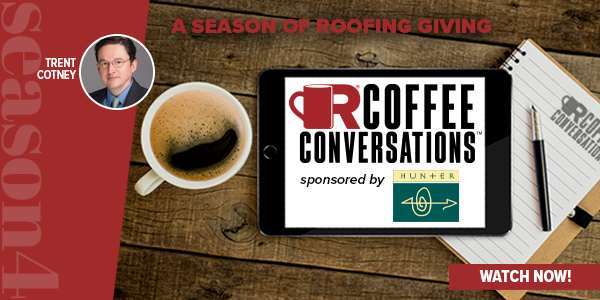
Coffee Conversations - A Season of Giving with Trent Cotney Sponsored by Hunter Panels! - PODCAST TRANSCRIPTION
Read More ...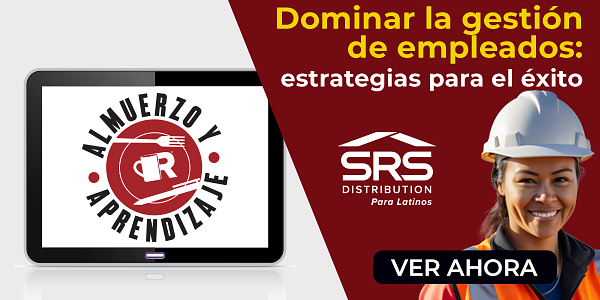
Mastering Employee Management: Strategies for Success - Podcast Transcript
Read More ...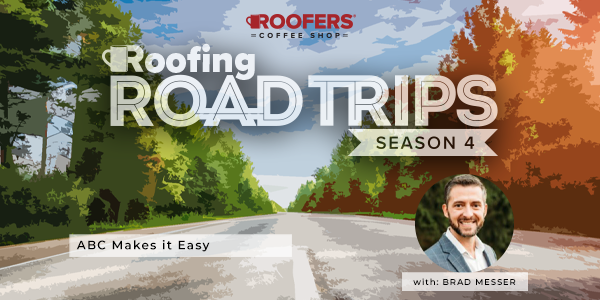
Brad Messer - ABC Makes it Easy - PODCAST TRANSCRIPTION
Read More ...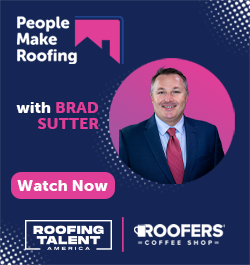

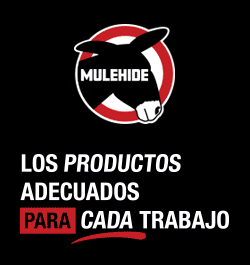


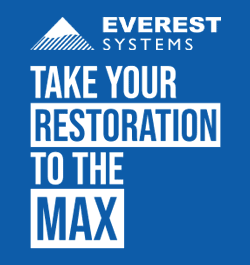








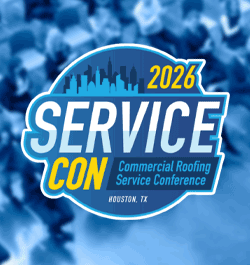


Comments
Leave a Reply
Have an account? Login to leave a comment!
Sign In